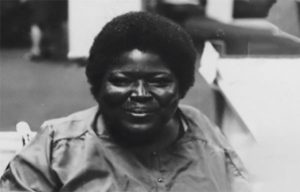To mark Black History Month 2021, we will be posting several guest posts on unheard or little-known stories. Some are from Lincolnshire, others from the wider world may be better-known elsewhere, but we should know them better here, and find inspiration in them. This blog was written by Olivia Hennessy, on behalf of the University of Lincoln Students Equality, Diversity and Inclusion Committee (SEDIC).
The theme we have chosen for Black History Month is Black disability history. We felt that this group should be more represented and recognised by students so they can share the stories of Black disabled activists. This series will focus on activists and Black activism for disability. Let’s start with Johnnie Lacy.
Lacy’s upbringing in the US deep south shaped her understanding of race in the 1930s and 1940s. The education system in Louisiana demonstrates the racial segregation that Johnnie Lacy faced.
At the age of 19, Lacy contracted polio which left her paralysed. This was while she was in the middle of studying for a nursing degree. She also was battling ableism and discrimination. Lacy later went on to study at San Francisco State University, but her re-entry into education was not easy. Her head of department attempted to deny her entry onto her course. Eventually, Lacy was allowed to enrol, but was not allowed to participate in her graduation or be a part of her school. From her college experiences, Lacy describes how she viewed her blackness with her disability:
‘But I basically was forming my own personal philosophy and political philosophy, and I never really felt completely a part of a movement, African-American movement, mainly because I was very much aware that I was not particularly acknowledged as an African-American with a disability who had ideas, who could contribute, and all of those things. That also was kind of a later development for me.
It has been problematic for blacks to identify with disability. My classmates would have had to accept my disability within the same intellectual framework as my blackness–that of an oppressed minority opposite.’
I believe that African Americans see disability in the same way that everybody else sees it–worthless, mindless–without realizing that this is the same attitude held by others toward African Americans. This belief in effect cancels out the black identity they share with a disabled black person, both socially and culturally, because the disability experience is not viewed in the same context as if one were only black, and not disabled. Because of this myopic view, I as a black disabled person could not share in the intellectual dialogue viewed as exclusive to black folk. In other words, I could be one or the other but not both.’
All of this led to her become a disability rights activist, working for Berkeley’s Centre for Independent Living and similar institutions, and she eventually became the Director of Community Resources for Independent Living in Hayward, California.
Lacy often spoke of being excluded from the Black community due to her disability and from the disability community due to being a person of colour. As a Black woman in a wheelchair, she educated her communities about race and disability and served as a role model for many other black women with disabilities. She was, and continues to be, an inspiring woman that deserves more recognition, so that is why SEDIC has written about this powerful individual.
References:
Ramp Your Voice. ‘Black History Month 2017: Johnnie Lacy, Defiantly Black and Disabled’, February 10th 2017. [Accessed on 29/09/21] http://www.rampyourvoice.com/black-history-month-2017-johnnie-lacy-defiantly-black-disabled/
Comments are closed.